

A Feud in Wolf-Kink Erotica Raises a Deep Legal Question – DNyuz. Addison Cain was living in Kyoto, volunteering at a shrine and studying indigenous Japanese religion.
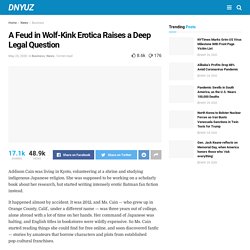
The Catalog of Copyright Entries: Registrations, 1924-1949. Part 2: Copyrightability of #RPG Abilities and Spells #DnD #copyright #iplaw – Frylock's Gaming & Geekery. Part 1: Copyrightability of #RPG Stat Blocks #DnD #copyright #iplaw – Frylock's Gaming & Geekery. I received an email from Wizards of the Coast (“WotC”) demanding that I take down my one-stop stat blocks.
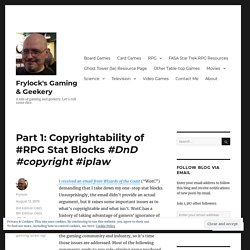
Unsurprisingly, the email didn’t provide an actual argument, but it raises some important issues as to what’s copyrightable and what isn’t. WotC has a history of taking advantage of gamers’ ignorance of contract and intellectual property law and lack of wealth when making similar demands, thus harming the gaming community and industry, so it’s time those issues are addressed. Most of the following arguments apply to any role-playing game produced by any game designer.
This is the first of three blog posts that I’m going to put out as quickly as possible. Secretly Public Domain. (15) Mon Jul 22 2019 08:39 Secretly Public Domain: "Fun facts" are, sadly, often less than fun.
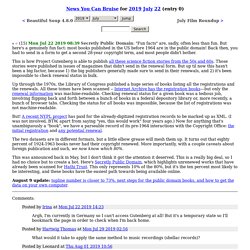
But here's a genuinely fun fact: most books published in the US before 1964 are in the public domain! Back then, you had to send in a form to get a second 28-year copyright term, and most people didn't bother. This is how Project Gutenberg is able to publish all these science fiction stories from the 50s and 60s. Those stories were published in issues of magazines that didn't send in the renewal form. Data-mining reveals that 80% of books published 1924-63 never had their copyrights renewed and are now in the public domain. This January, we celebrated the Grand Re-Opening of the Public Domain, as the onerous terms of the hateful Sonny Bono Copyright Act finally developed a leak, putting all works produced in 1923 into the public domain, with more to follow every year — 1924 goes PD in 2020, and then 1925, etc.
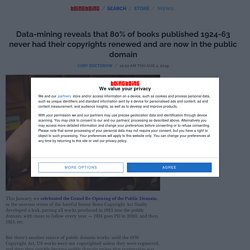
But there's another source of public domain works: until the 1976 Copyright Act, US works were not copyrighted unless they were registered, and then they quickly became public domain unless that registration was renewed. You can’t copyright a cocktail, so what’s a creative bartender to do? NEW ORLEANS—Anyone who fancies themselves a fan of cocktails knows the names: the Manhattan, Old Fashioned, Martini, Margarita, on and on and on.
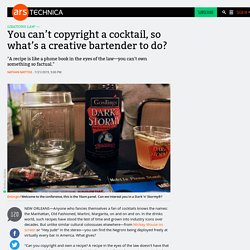
In the drinks world, such recipes have stood the test of time and grown into industry icons over decades. But unlike similar cultural colossuses elsewhere—from Mickey Mouse on screen or "Hey Jude" in the stereo—you can find the Negroni being deployed freely at virtually every bar in America. What gives? Understanding Your Contract. Europe’s controversial overhaul of online copyright receives final approval.
'Star Trek'/Dr. Seuss Mashup Deemed Copyright Fair Use by Judge. Ringing in the New Year with new public domain content. Happy New Year, everyone!

MMOs like City of Heroes might live again thanks to a new DMCA exemption. Dead MMOs like Star Wars Galaxies or City of Heroes might have a second chance at life thanks to recent changes to US copyright rules.
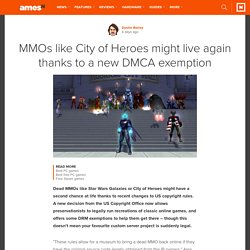
A new decision from the US Copyright Office now allows preservationists to legally run recreations of classic online games, and offers some DRM exemptions to help them get there – though this doesn’t mean your favourite custom server project is suddenly legal. “These rules allow for a museum to bring a dead MMO back online if they have the original source code legally obtained from the IP owners,” Alex Handy, founder of the Museum of Art and Digital Entertainment tells me via email. “Once that demand is met, we can open the games for players on the Internet.
Copyright Law Just Got Better for Video Game History. A new ruling from the Librarian of Congress is good news for video game preservation.
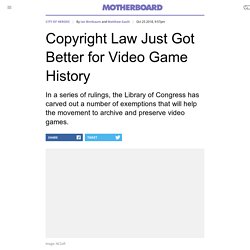
In an 85-page ruling that covered everything from electronic aircraft controls to farm equipment diagnostic software, the Librarian of Congress carved out fair use exemptions to the Digital Millennium Copyright Act (DMCA) for video games and software in general. These exemptions will make it easier for archivists to save historic video games and for museums to share that cultural history with the public. “The Acting Register found that the record supported granting an expansion in the relatively discrete circumstances where a preservation institution legally possesses a copy of a video game’s server code and the game’s local code,” the Librarian of Congress said. “In such circumstances, the preservation activities described by proponents are likely to be fair uses.” These rules are definitely good news for single-player games. THE COPYRIGHT AND OWNERSHIP STATUS OF THE WORKS AND WORDS OF ROBERT E. Prepared by Paul Herman for REHeapa Updated, May 1, 2007 This article is a condensed version of a legal article that is being prepared for possible publication.
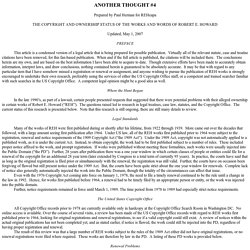
Conan and copyright, by Crom! A $1.6 billion Spotify lawsuit is based on a law made for player pianos. Spotify is finally gearing up to go public, and the company’s February 28th filing with the SEC offers a detailed look at its finances.
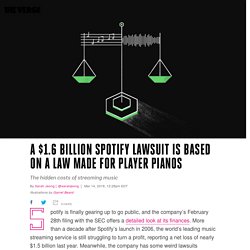
More than a decade after Spotify’s launch in 2006, the world’s leading music streaming service is still struggling to turn a profit, reporting a net loss of nearly $1.5 billion last year. Meanwhile, the company has some weird lawsuits hanging over its head, the most eye-popping being the $1.6 billion lawsuit filed by Wixen Publishing, a music publishing company that includes the likes of Tom Petty, The Doors, and Rage Against the Machine. So, what happened here? Did Spotify really fail to pay artists to the tune of a billion dollars all the while losing money? Is digital streaming just a black hole that sucks up money and spits it out into the cold vacuum of space?
"Blurred Lines" Appeal Brief Says Artists Can't Copyright a Groove. Why Mickey Mouse’s 1998 copyright extension probably won’t happen again. 2018 Is the Last Year of America's Public Domain Drought. Dr. Seuss and Star Trek mashup comic isn’t fair use after all, judge says. Supreme Court Says You Can Copyright Elements Of 'Useful Articles' Last summer, we wrote about a potentially important case going to the Supreme Court, technically about the copyright design of cheerleading uniforms. As we've discussed, copyright is supposed to apply to artistic expression, and it's been considered not to apply to functional products or industrial design -- sometimes referred to as "useful articles.
" Along those lines, things like fashion design, have always been considered not subject to copyright. In this case, Star Athletica v. Varsity Brands, the question was raised about the design of certain stylistic elements on cheerleading uniforms, and whether one copy using similar elements on its cheerleading uniforms infringed on the copyrights of the other. A district court said no, the appeals court said yes. T-Shirts: How does TeeFury deal with copyright infringement from some of its products? - Quora. Copyright Law. On The Legal Standard for Copyright Infringement Douglas Y'Barbo(1) Introduction [1]Copyright is a federal legal regime of exceptional influence on both American art and commerce. Literature, film, music, sculpture, architecture, and software all rely primarily upon federal copyright law for protection against unauthorized copying, which, if left unconstrained, would unquestionably squelch the incentives to create, or to invest in such creation. [2]Yet the legal standard relied upon to determine copyright infringement is deeply fissured between the two major copyright courts--the Second and Ninth Circuits.(2) The remaining regional circuits appear to be unaware of this fissure, as evidenced by the fact that several of them apply both tests interchangeably.